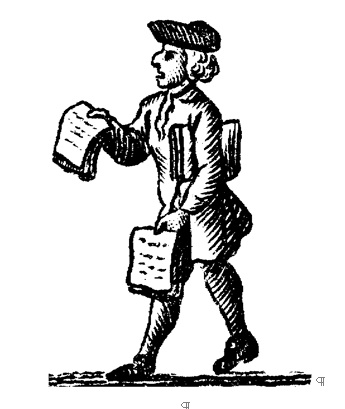Pamphleteers on:
[Wikipedia]
[Google]
[Amazon]
 Pamphleteer is a historical term for someone who creates or distributes
Pamphleteer is a historical term for someone who creates or distributes
"From Slavery to Freedom: The African-American Pamphlet Collection, 1822-1909"
* James A. Oliver
"The Pamphleteers" by James A. Oliver
(PBK) and (HBK). Pamphlets Activism by type {{job-stub
 Pamphleteer is a historical term for someone who creates or distributes
Pamphleteer is a historical term for someone who creates or distributes pamphlet
A pamphlet is an unbound book (that is, without a hard cover or binding). Pamphlets may consist of a single sheet of paper that is printed on both sides and folded in half, in thirds, or in fourths, called a ''leaflet'' or it may consist of a ...
s, unbound (and therefore inexpensive) booklets intended for wide circulation.
Context
Pamphlets were used to broadcast the writer's opinions: to articulate a political ideology, for example, or to encourage people to vote for a particular politician. Early modern news pamphlets also made extensive use of stock imagery to describe, highlight, or criticize various social and cultural events and issues. During times of political unrest, such as theFrench Revolution
The French Revolution ( ) was a period of radical political and societal change in France that began with the Estates General of 1789 and ended with the formation of the French Consulate in November 1799. Many of its ideas are considere ...
, pamphleteers were highly active in attempting to shape public opinion. Before the advent of telecommunication
Telecommunication is the transmission of information by various types of technologies over wire, radio, optical, or other electromagnetic systems. It has its origin in the desire of humans for communication over a distance greater than that fe ...
s, those with access to a printing press
A printing press is a mechanical device for applying pressure to an inked surface resting upon a printing, print medium (such as paper or cloth), thereby transferring the ink. It marked a dramatic improvement on earlier printing methods in wh ...
and a supply of paper often used pamphlets to widely disseminate their ideas.
Famous pamphleteers
Thomas Paine
Thomas Paine (born Thomas Pain; – In the contemporary record as noted by Conway, Paine's birth date is given as January 29, 1736–37. Common practice was to use a dash or a slash to separate the old-style year from the new-style year. In th ...
's pamphlets were influential in the history of the American Revolutionary War
The American Revolutionary War (April 19, 1775 – September 3, 1783), also known as the Revolutionary War or American War of Independence, was a major war of the American Revolution. Widely considered as the war that secured the independence of t ...
.James A. Henretta et al. (2011). America's History, Volume 1: To 1877. Macmillan. p. 165. . 17th-century Dutch naval officer Witte de With
Witte Corneliszoon de With (28 March 1599 – 8 November 1658) was a Dutch naval officer. He is noted for planning and participating in a number of naval battles during the Eighty Years War and the First Anglo-Dutch war.
Early life and chil ...
wrote papers mocking and praising his fellow officers. Poet and polemicist John Milton
John Milton (9 December 1608 – 8 November 1674) was an English poet and intellectual. His 1667 epic poem '' Paradise Lost'', written in blank verse and including over ten chapters, was written in a time of immense religious flux and political ...
published pamphlets as well. Jonathan Edwards and John Calvin
John Calvin (; frm, Jehan Cauvin; french: link=no, Jean Calvin ; 10 July 150927 May 1564) was a French theologian, pastor and reformer in Geneva during the Protestant Reformation. He was a principal figure in the development of the system ...
changed the course of Christianity with their pamphlets.
See also
*Broadside
Broadside or broadsides may refer to:
Naval
* Broadside (naval), terminology for the side of a ship, the battery of cannon on one side of a warship, or their near simultaneous fire on naval warfare
Printing and literature
* Broadside (comic ...
* Ephemera
Ephemera are transitory creations which are not meant to be retained or preserved. Its etymological origins extends to Ancient Greece, with the common definition of the word being: "the minor transient documents of everyday life". Ambiguous in ...
* Manuscript
A manuscript (abbreviated MS for singular and MSS for plural) was, traditionally, any document written by hand – or, once practical typewriters became available, typewritten – as opposed to mechanically printing, printed or repr ...
* Tract
Tract may refer to:
Geography and real estate
* Housing tract, an area of land that is subdivided into smaller individual lots
* Land lot or tract, a section of land
* Census tract, a geographic region defined for the purpose of taking a census
...
References
External links
"From Slavery to Freedom: The African-American Pamphlet Collection, 1822-1909"
* James A. Oliver
"The Pamphleteers" by James A. Oliver
(PBK) and (HBK). Pamphlets Activism by type {{job-stub